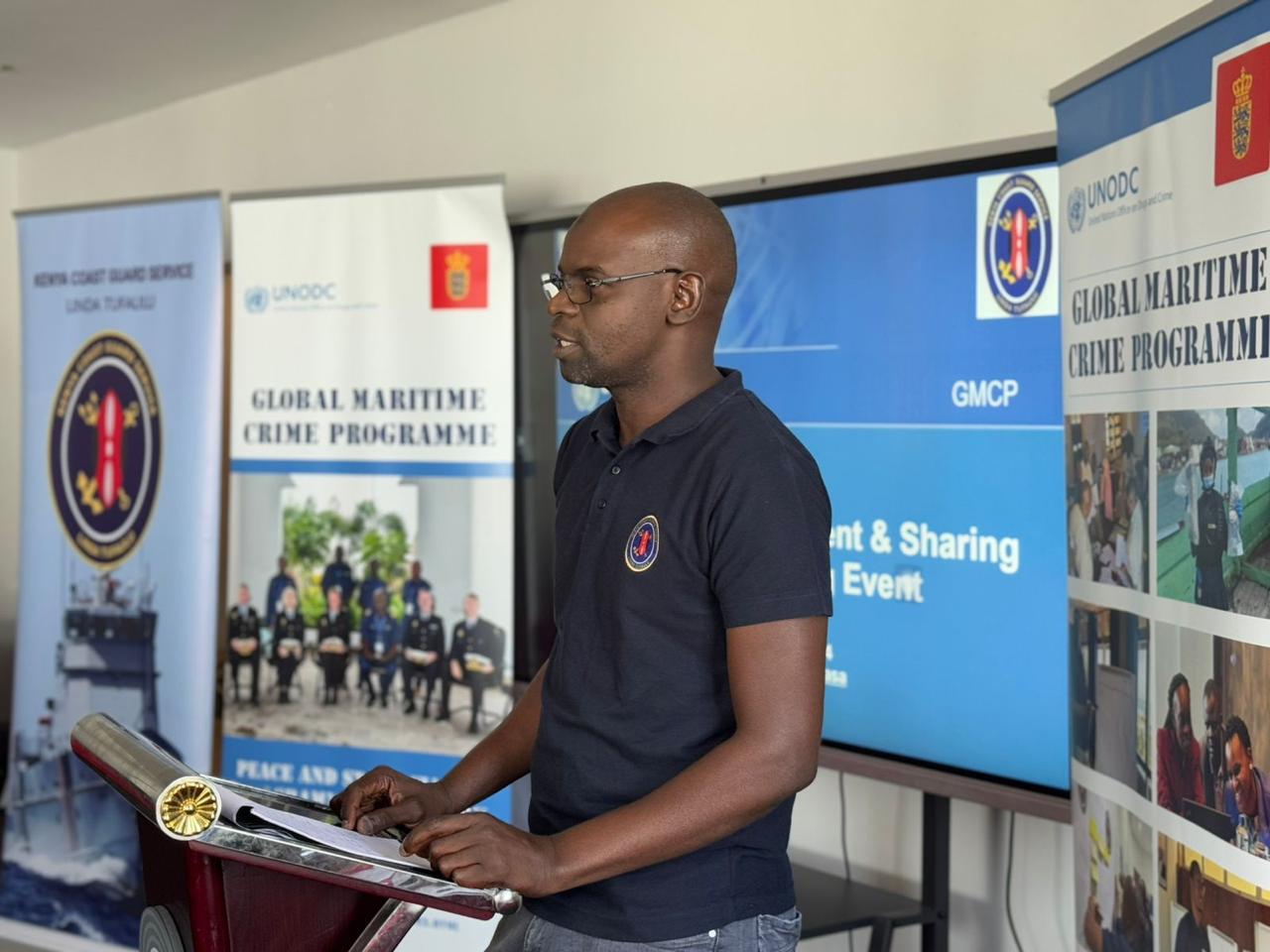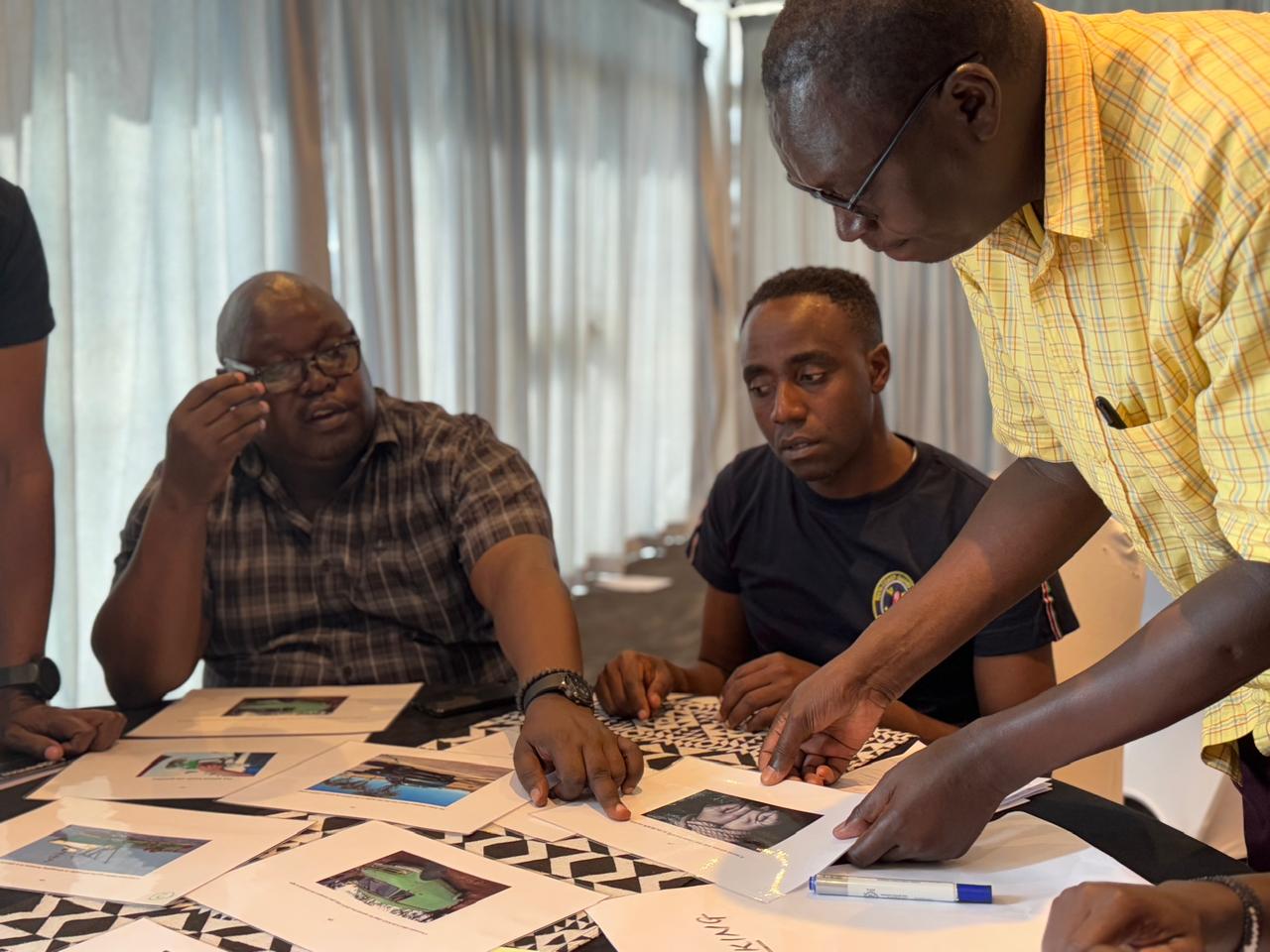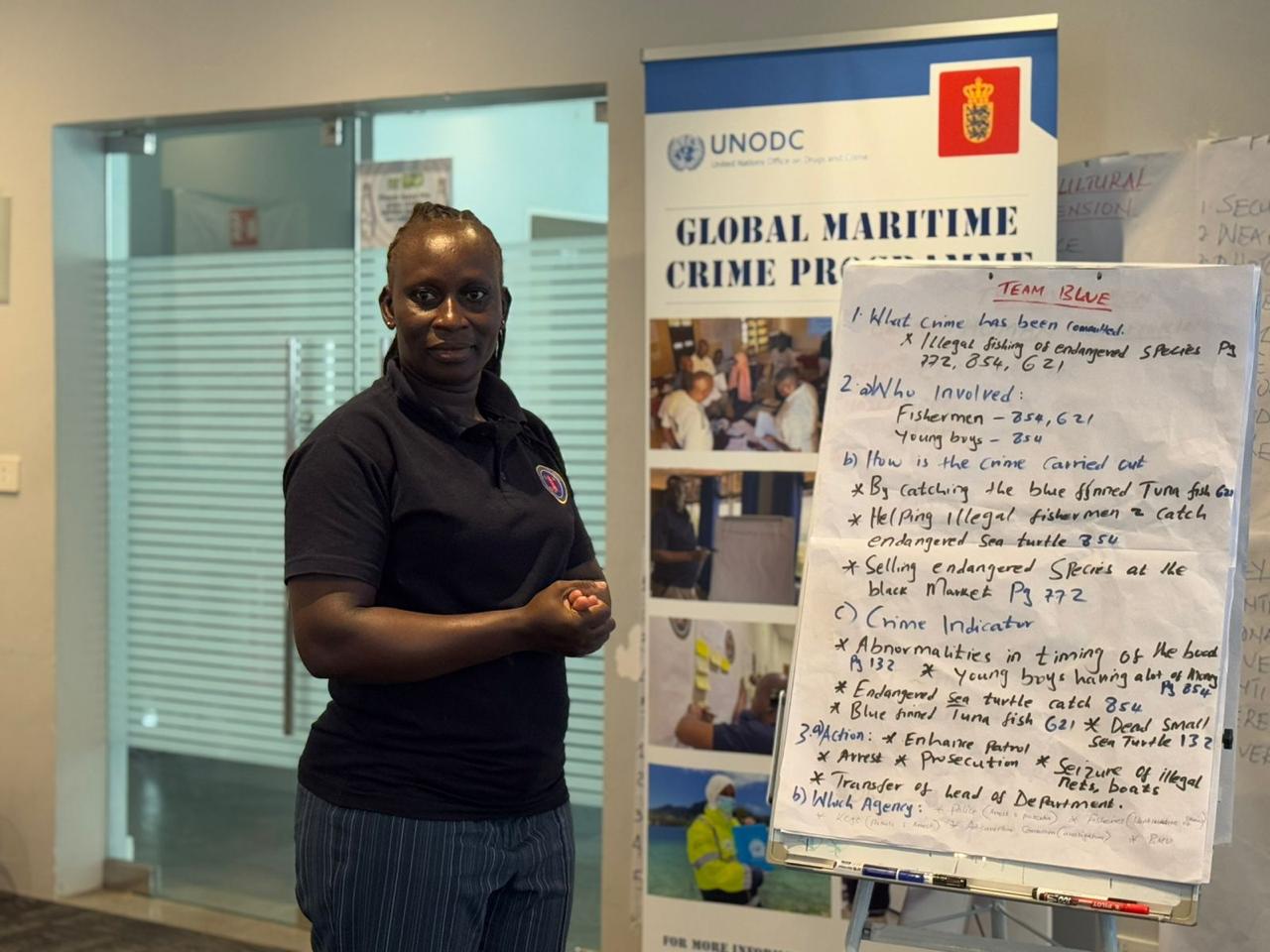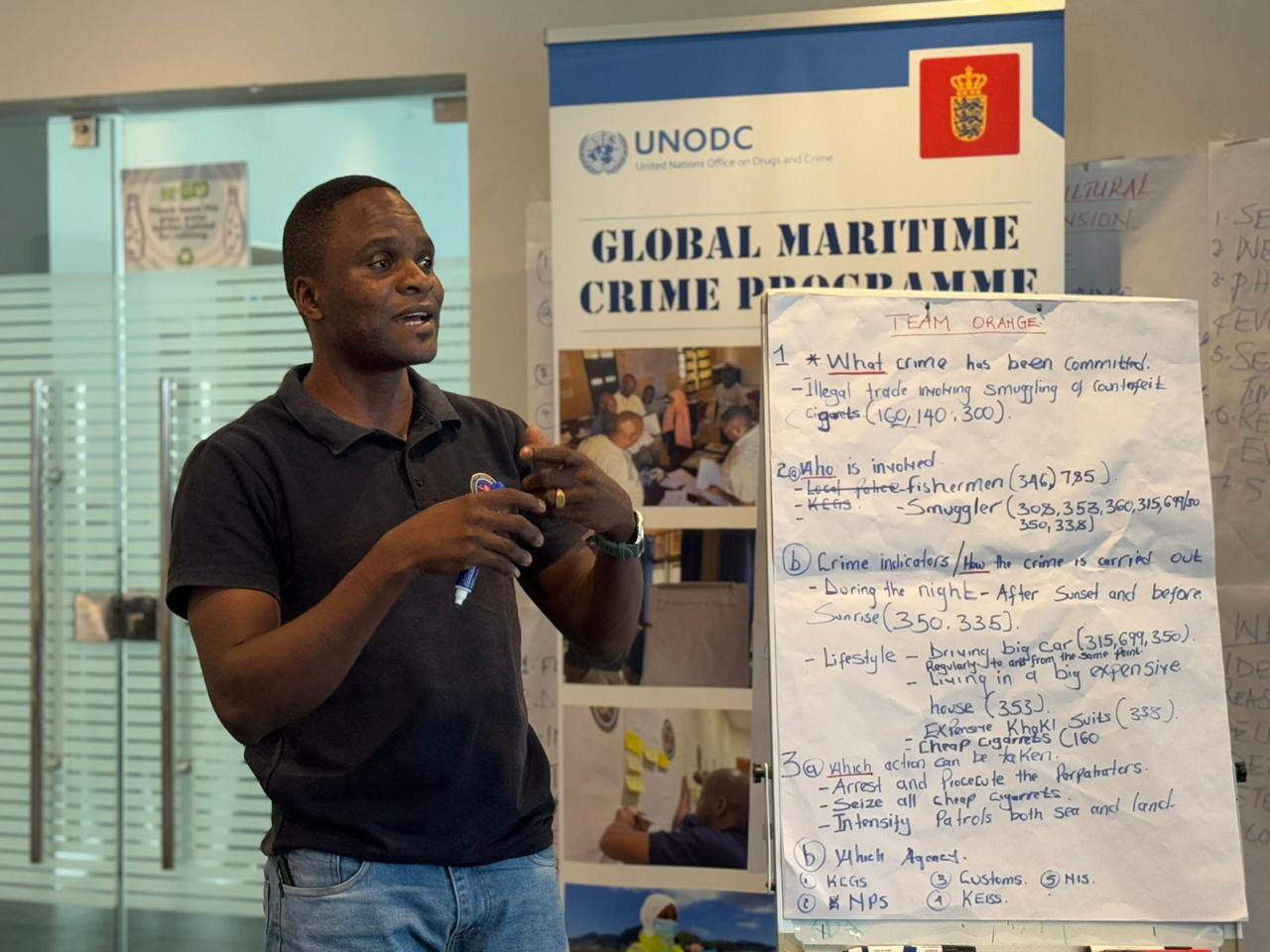UNODC Eastern Africa News and Stories
You are here: Home / News
National Instructor-led Multi Agency Information Management and Sharing Training
On 8 November, under the Peace and Stabilisation Programme IV, the United Nations Office on Drugs and Crime (UNODC) Global Maritime Crime Programme (GMCP) concluded a one-week Information Management and Sharing training in Mombasa, Kenya. This event marked a significant achievement as it was the first time the training was entirely led by three instructors from the Kenya Coast Guard Service (KCGS), all trained by UNODC with the support of the Danish National Police. This comprehensive training, aimed at enhancing maritime security and inter-agency collaboration, involved theoretical sessions and hands-on practical exercises. Participants delved into topics such as information collection, data analysis, secure communication, and report generation, all tailored to the unique challenges of maritime law enforcement.
 “My name is Lieutenant Commander Mwine, and I am a national instructor. I work with the KCGS as a fleet enforcement officer and currently manage the KCGS service project office. I became a national instructor in 2021, attending my first Information Management and Sharing training as a particiant and progressing to the national instructor level. This was the ninth training we have conducted, targeting multi-agency teams, including border management committees, maritime ports, and land border points. “Working with a diverse team at the Coast Guard has given me valuable experience in managing multi-agency collaboration, which I now bring to our training sessions.”
“My name is Lieutenant Commander Mwine, and I am a national instructor. I work with the KCGS as a fleet enforcement officer and currently manage the KCGS service project office. I became a national instructor in 2021, attending my first Information Management and Sharing training as a particiant and progressing to the national instructor level. This was the ninth training we have conducted, targeting multi-agency teams, including border management committees, maritime ports, and land border points. “Working with a diverse team at the Coast Guard has given me valuable experience in managing multi-agency collaboration, which I now bring to our training sessions.”
The multi-agency training brought together 24 participants from various maritime law enforcement bodies, fostering collaboration and a unified approach to maritime security. Participants explored the critical importance of inter-agency information sharing, showcasing how coordinated efforts can significantly enhance the fight against crimes on land and sea such as illegal fishing and goods smuggling.
 The training featured a scenario-based exercise to reinforce the concepts taught throughout the week on information management sharing. The scenario involved a complex story, strategically broken down into smaller pieces and distributed among groups. Each group had to rely on effective information management and sharing to piece together the entire narrative, underscoring the core principles of the training. Lieutenant Commander Mwine noted that the exercise served as an excellent test of the participant's understanding: “It is a scenario that demands focus on the training content. The trainees would never uncover the full story without applying what they have learned, it was clear how engaged the participants were—they were absorbed in solving the scenario and were eager to collaborate and reach the desired outcome.
The training featured a scenario-based exercise to reinforce the concepts taught throughout the week on information management sharing. The scenario involved a complex story, strategically broken down into smaller pieces and distributed among groups. Each group had to rely on effective information management and sharing to piece together the entire narrative, underscoring the core principles of the training. Lieutenant Commander Mwine noted that the exercise served as an excellent test of the participant's understanding: “It is a scenario that demands focus on the training content. The trainees would never uncover the full story without applying what they have learned, it was clear how engaged the participants were—they were absorbed in solving the scenario and were eager to collaborate and reach the desired outcome.
 Joseph, representing the Kenya Maritime Authority, highlighted the life-saving potential of these skills: “My role in the Lake Region involves coordinating complex, high-stakes rescue operations across multiple agencies. This training has provided me with invaluable skills to strengthen the bonds between our organizations, improving our capacity to work as a united front in emergencies. Time is of the essence in search and rescue, and effective information sharing between agencies can be the difference between life and death.” Catherine from the Kenya Coast Guard Service echoed this sentiment, “The training has been incredibly helpful, especially in improving information sharing between agencies. For example, during patrols, we often encounter illegal fishing. Through collaboration and shared insights, we can analyze the situation and take decisive, well-informed actions to address such challenges effectively.”
Joseph, representing the Kenya Maritime Authority, highlighted the life-saving potential of these skills: “My role in the Lake Region involves coordinating complex, high-stakes rescue operations across multiple agencies. This training has provided me with invaluable skills to strengthen the bonds between our organizations, improving our capacity to work as a united front in emergencies. Time is of the essence in search and rescue, and effective information sharing between agencies can be the difference between life and death.” Catherine from the Kenya Coast Guard Service echoed this sentiment, “The training has been incredibly helpful, especially in improving information sharing between agencies. For example, during patrols, we often encounter illegal fishing. Through collaboration and shared insights, we can analyze the situation and take decisive, well-informed actions to address such challenges effectively.”
 This scenario-based approach highlighted the practical value of information management and sharing, emphasizing its importance for effective inter-agency collaboration. The fully national instructor-led milestone proves the ongoing efforts to build local capacity, ensuring that maritime security agencies in Kenya are equipped to conduct essential training without external assistance. Lieutenant Commander Mwine highlighted how this growing collaboration is reshaping national security: “The network of over 500 individuals from different agencies now shares a common understanding of managing and sharing information, which has been a major step forward in enhancing national security. Nowadays, incidents are being neutralized before they escalate, thanks to better information flow.”
This scenario-based approach highlighted the practical value of information management and sharing, emphasizing its importance for effective inter-agency collaboration. The fully national instructor-led milestone proves the ongoing efforts to build local capacity, ensuring that maritime security agencies in Kenya are equipped to conduct essential training without external assistance. Lieutenant Commander Mwine highlighted how this growing collaboration is reshaping national security: “The network of over 500 individuals from different agencies now shares a common understanding of managing and sharing information, which has been a major step forward in enhancing national security. Nowadays, incidents are being neutralized before they escalate, thanks to better information flow.”
Joseph emphasized that this initiative is more than training: “It's a transformative step toward safeguarding our waters. This is a catalyst for change, reflecting the government’s commitment to a unified and effective approach. By fostering collaboration and shared strategies, we are fortifying our nation’s resilience and paving the way for safer, more secure waters for generations to come."
For more information, please contact:
Mr. David O’Connell (David.OConnell@un.org)
Western Indian Ocean Programme Coordinator
Global Maritime Crime Programme
United Nations Office on Drugs and Crime
Click here to visit the UNODC Global Maritime Crime Programme website.